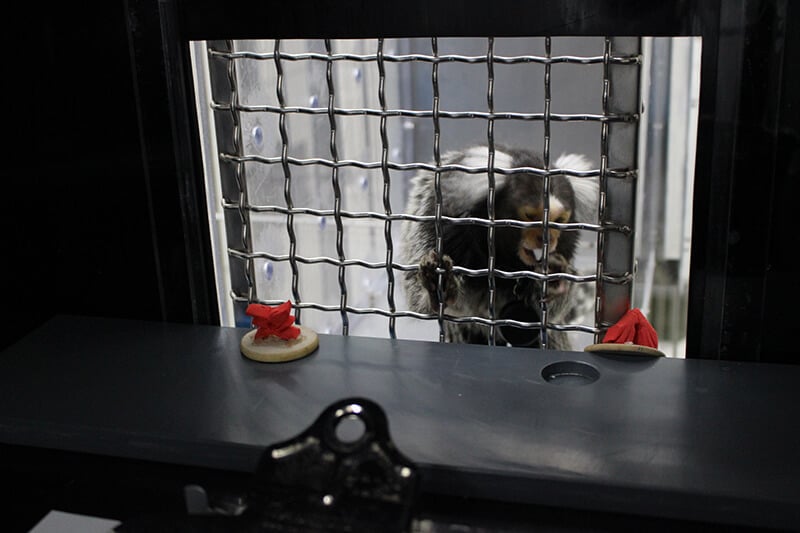Victory! UW-Madison Ends Painful Sleep Experiment After a Wake-Up Call From PETA
Update (June 26, 2024): Victory! After hearing from PETA and thousands of supporters like you, a pointless sleep experiment on marmoset monkeys at the University of Wisconsin–Madison has ended.
In the nightmarish test coordinated by University of Massachusetts–Amherst experimenter Agnès Lacreuse, UW-Madison experimenters planned to repeatedly blast up to a dozen monkeys with sounds as loud as a lawn mower to prevent them from sleeping for up to 24 nights—a procedure so cruel it earned the highest pain classification possible. Records obtained by PETA show that ultimately, six monkeys were used in the test, which ceased after one night of torment.
We couldn’t have achieved this win without your powerful voice. Please use your considerable sway to save more marmosets from Lacreuse by urging the University of Massachusetts–Amherst to shut down her home laboratory immediately:
Update (January 26, 2024): After hearing from PETA, the animal oversight committee at the University of Wisconsin–Madison decided that the experiment being planned there at the request of Agnès Lacreuse—in which tiny, sensitive marmosets would be prevented from sleeping more than 15 minutes at a stretch for several nights a week—should be reclassified into the most painful category. This is a good first step. But PETA won’t rest until the whole experiment is shut down. We’ve written to National Institutes of Health Director Monica Bertagnolli urging her to yank funding for the experiment immediately—before any marmosets are harmed by Lacreuse’s preposterous tests.
We’ve also called on Florida Gov. Ron DeSantis to speak out against this absurd experiment. As the leader of the state with the highest per-capita population of older Americans, DeSantis knows we need to be funding sound science, not cruel monkey business!
You can help protect animals from Lacreuse by urging the University of Massachusetts–Amherst to shut down her home laboratory immediately.
University of Wisconsin–Madison officials have green-lit experiments on marmosets that are so cruel, so pointless, and so patently bereft of scientific rigor—while also managing to be rife with ineptitude that it strains credulity to think they could ever have been approved by anyone. And guess what? They came from the notorious University of Massachusetts–Amherst’s (UMass) Agnès Lacreuse.
PETA scientists combed through hundreds of pages of documents to untangle this nasty web. Here’s what we found.

At Lacreuse’s request and with funding from the National Institutes of Health (NIH), experimenters at the Wisconsin National Primate Research Center, located on the campus of UW-Madison, intend to prevent tiny, sensitive marmosets from sleeping more than 15 minutes at a stretch for several nights a week in a wrongheaded attempt to somehow glean insight into the effects of sleep deprivation on humans’ ability to think clearly and the effects of sleep deprivation on Alzheimer’s disease.
PETA is calling for investigations by NIH and the U.S. Department of Agriculture because these experiments are inherently flawed, add nothing to scientific knowledge, and appear to violate numerous animal welfare regulations, among other serious concerns. PETA is also asking the National Institute on Aging (NIA) to yank the experiment’s funding.
The Details
Every 15 minutes during the night, experimenters blast the monkeys for six full minutes with noises measuring from 60 to 90 decibels. By comparison, the average noise from a vacuum cleaner is about 70 decibels. The monkeys will be startled awake as many as 46 times during the night for a total of 276 minutes for three consecutive nights.
The experiments break no new ground. A wealth of published information already exists about the effects of sleep deprivation on cognitive decline in humans. Numerous other studies have already examined the same effects of sleep deprivation in human volunteers, and they were all completed without a monkey body count. The experiment proposal should have been tossed out immediately.
Fatal Flaws
The setup of the experiment can’t possibly shed light on human age-related cognitive decline. Humans who experience poor sleep aren’t suffering because they’re startled awake by loud noises at preset intervals but rather because they suffer from poor sleep for biological and neurological reasons not covered by this experiment.
In addition, marmosets aren’t miniature humans. Numerous physiological and biological differences between species make marmosets a poor stand-in for humans, rendering useless any information from the experiments.
Bait and Switch?
In order to get the money to bankroll this travesty, experimenters had to classify the amount of pain they were going to inflict on the monkeys. They said it was minimal.
It’s not. And the funding should be yanked for this reason.

Not only are marmosets in this experiment deprived of sleep, they’re also subjected to chronic captivity, repeated fluid restriction, and restraint. The cumulative effect is permanent physical and psychological harm.
All this was unrepresented or downplayed in the grant proposal.
Who’s on First?
This experiment was funded by a grant from NIA two years ago, when it was slated for a laboratory at UMass, where Lacreuse would conduct it. Many months later, UW-Madison is still debating how it will be conducted, what will happen to the animals, and even what equipment it should use, according to information PETA obtained.
Vote for Me!
UW-Madison primate experimenter Ricki Colman is slated to be the chief experimenter for these experiments. She’s also the head of the laboratory’s animal oversight committee, which voted to approve the project she’ll conduct. Unsurprisingly, appearing to exert undue influence on the vote like this likely violates a mess of regulations—another reason that funding should be canceled.
What You Can Do
Please take action today and demand that UMass shut down Lacreuse’s laboratory immediately.

